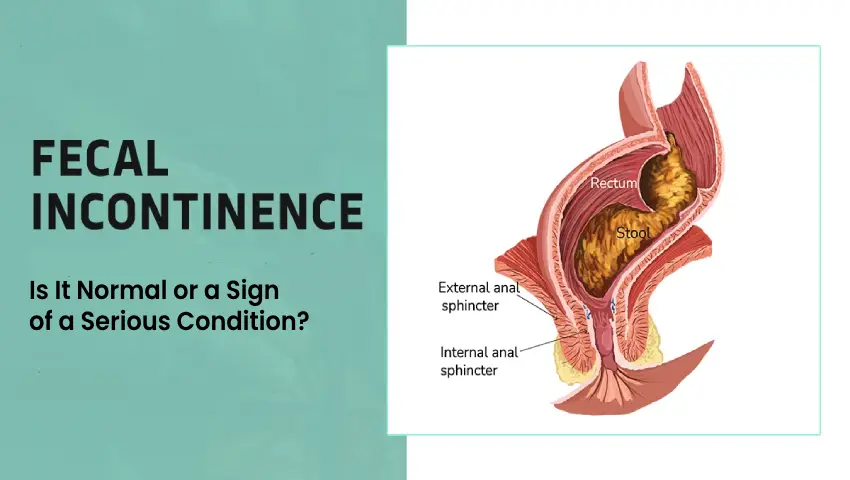
- 08/05/2025
- Dr. Samrat Jankar
- 0 Comments
- Blog
Understanding Fecal Incontinence: Is It Normal or a Sign of a Serious Condition?
Fecal incontinence, often an uncomfortable and rarely discussed topic, is a condition that affects many individuals—particularly older adults—but is frequently misunderstood. Often brushed off as a minor problem or a part of aging, fecal incontinence can significantly affect quality of life. The question many people ask is, “Is fecal incontinence normal?” The answer is: No. While it may be common in certain people, it is not normal and should not be ignored.
In this blog, Dr. Samrat Jankar, one of the best colorectal surgeon in Pune, sheds light on this often-neglected condition, its causes, when it becomes serious, and how it can be effectively managed or treated.
What is Fecal Incontinence?
Fecal incontinence also known as bowel incontinence is the inability to control bowel movements, resulting in the accidental passage of stool, ranging from occasional leakage when passing gas to a complete loss of bowel control.
There are different types of fecal incontinence:
- Urge incontinence: A sudden, severe urge to have a bowel movement followed by involuntary stool passage.
- Passive incontinence: Stool leaks without the person being aware of it.
- Functional incontinence: The person is physically unable to get to a toilet in time due to a mobility problem or neurological condition.
Is It Normal to Have Fecal Incontinence?
The answer is no, fecal incontinence is not considered normal, especially if it happens frequently or disrupts daily activities.
Occasional stool leakage might happen in certain situations:
- After a severe bout of diarrhea or food poisoning.
- In the elderly with chronic constipation or rectal prolapse.
- Post-childbirth in women, especially after vaginal deliveries with complications.
However, if this issue becomes regular or worsens over time, it is a symptom of an underlying medical or anatomical problem that requires diagnosis and treatment.
Common Causes of Fecal Incontinence:
Fecal incontinence can result from a variety of causes, including:
- Muscle Damage: Damage to the anal sphincter muscles during childbirth, surgery, or trauma can reduce control over bowel movements.
- Nerve Damage: Conditions like diabetes, multiple sclerosis, or spinal cord damage can impair the nerves that control the bowel and rectum.
- Chronic Constipation: Ongoing constipation can cause the rectum to stretch, weakening the muscles and nerves involved in bowel control.
- Diarrhea: Loose stools are harder to control, making incontinence more likely, especially if sphincter function is already weak.
- Pelvic Floor Disorders: Conditions such as rectal prolapse or rectocele can disrupt normal bowel function and lead to incontinence.
- Age-related Weakness: With aging, muscle tone around the anus may weaken, but again, this is common—not normal.
When Should You Be Concerned?
Fecal incontinence is a red flag that something may be wrong with your gastrointestinal, muscular, or nervous system. You should see a specialist like a gastroenterologist or colorectal surgeon in Pune if you experience:
- Involuntary leakage more than once a month
- Loss of sensation of bowel fullness
- Frequent accidents interfering with daily life
- Accompanying symptoms like abdominal pain, weight loss, blood in stool, or ongoing diarrhea
- A history of nerve or spine disorders, or pelvic trauma
Timely evaluation can prevent complications such as skin infections, psychological distress, and worsening incontinence.
Diagnosis: What to Expect:
At Kaizen Gastro Care, we perform a thorough evaluation to understand the cause of fecal incontinence:
- Medical History and Physical Exam: Understanding the pattern of incontinence, associated illnesses, medications, and past surgeries helps narrow down causes.
- Anorectal Manometry: This test estimates the strength of the anal sphincter and rectal sensation.
- Endoanal Ultrasound: This imaging test detects sphincter muscle tears or defects.
- Defecography: An X-ray or MRI is done while the patient attempts a bowel movement to assess rectal function.
- Colonoscopy: Used if inflammatory bowel disease or tumors are suspected.
With the right diagnosis, treatment can be personalized to provide lasting relief.
Treatment Options:
The good news is that fecal incontinence is treatable, and most patients can regain bowel control and confidence with a comprehensive care plan.
Lifestyle Modifications:
- Diet adjustments to avoid trigger foods (e.g., caffeine, dairy, fatty foods)
- Adding fiber to bulk stools
- Timed bathroom visits
Medications:
- Anti-diarrheal agents (e.g., loperamide)
- Stool softeners for constipation
- Bile acid binders if diarrhea is caused by bile acid malabsorption
Pelvic Floor Therapy (Biofeedback):
Biofeedback and pelvic floor activities are effective non-surgical options to strengthen control.
Surgical Options:
When conservative management fails, surgery may be needed:
- Sphincteroplasty: Repairs torn sphincter muscles
- Sacral Nerve Stimulation (SNS): A pacemaker-like device to improve nerve signals
- Colostomy (rare cases): Rerouting the colon when other treatments fail
As a gastrointestinal surgeon, I carefully evaluate each patient to choose the least invasive yet most effective method.
Emotional Impact & Quality of Life:
Fecal incontinence doesn’t just affect physical health—it can take a serious toll on mental and emotional well-being. Individuals often feel embarrassed, isolated, or depressed. Many avoid social problems and experience a decrease in belief and self-esteem.
At Kaizen Gastro Care, we believe in treating the patient, not just the condition. Counseling, support groups, and a compassionate medical team make a big difference in recovery.
Conclusion:
Fecal incontinence is not a condition you have to live with. Whether it’s infrequent leakage or frequent accidents, it’s important to understand that help is available. It might be a symptom of an underlying condition that requires attention. Early diagnosis and treatment can dramatically enhance your quality of life.
If you or a loved one is struggling with fecal incontinence, don’t suffer in quiet. Reach out to Dr. Samrat Jankar at Kaizen Gastro Care, Pune, for expert evaluation and compassionate care.
